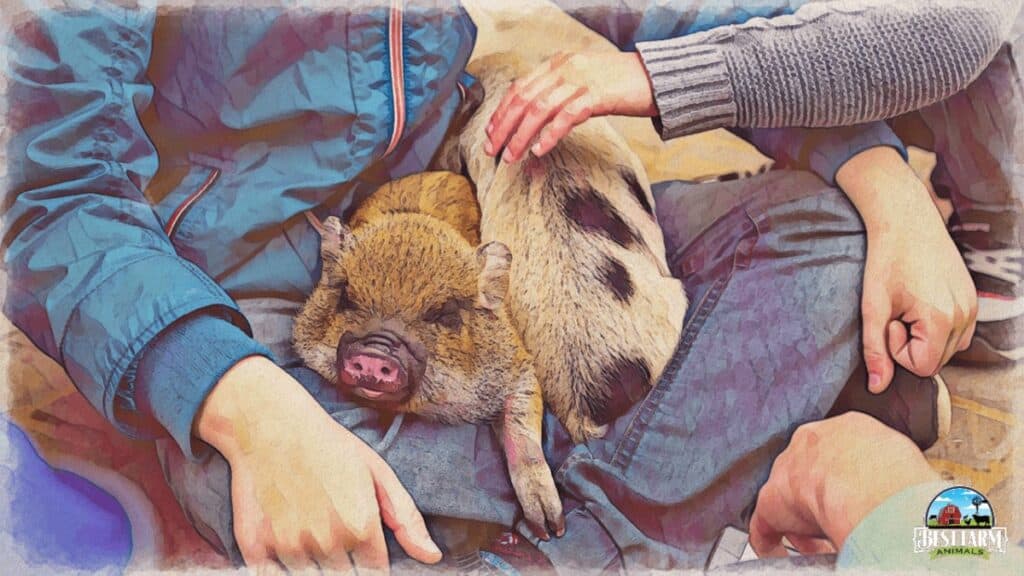I have raised pigs for years, but I almost didn’t because my first experience with a pig resulted in multiple pig bites. My first boar was aggressive and intimidating and bit me several times.
Because pigs are so large and strong, they can hurt badly when they bite. It made me nervous when I was around my first boar because of how aggressive he was. I didn’t want my kids to go near him.
Fortunately, I learned how to stop pig bites by better handling my pigs. As a result, my current boar is a gentle giant. He’s a pleasure to spend time around, and I don’t have to worry about getting bitten.
Do pigs bite humans? Domestic pigs are usually calm but can become aggressive and bite humans. When domesticated pigs bite people, it is usually because they are overly stressed. Stress arises when pigs have to compete for food or resources, are overcrowded, or ill.
They have strong jaws and sharp teeth and can bite if threatened or improperly handled. It is important to be careful when handling pigs and to take proper safety precautions to avoid being bitten.
I’m going to cover what you can do to curb pig bites, but first it will help if you understand the primary reasons pigs bite.
4 Primary Reasons an Aggressive Pig Bites People
There are four common reasons for pigs biting humans. Pigs usually bite people out of fear, aggression, dominance, or boredom. Pigs can accidentally bite when exploring new objects, such as something in a pocket, zippers, or buttons. Additionally, pigs may bite because of feed-related behaviors like hand-feeding or food rationing.
#1 Pigs Bite Out of Fear
Pigs are prey animals and, as such, are usually fearful of humans, especially while they’re still young. Pigs have few natural defenses and often turn to bite to protect themselves from a potential threat. Ignoring your piglet is usually an effective punishment if it is biting you.
Turn your face away from it. Avoid hand-feeding your piglets.
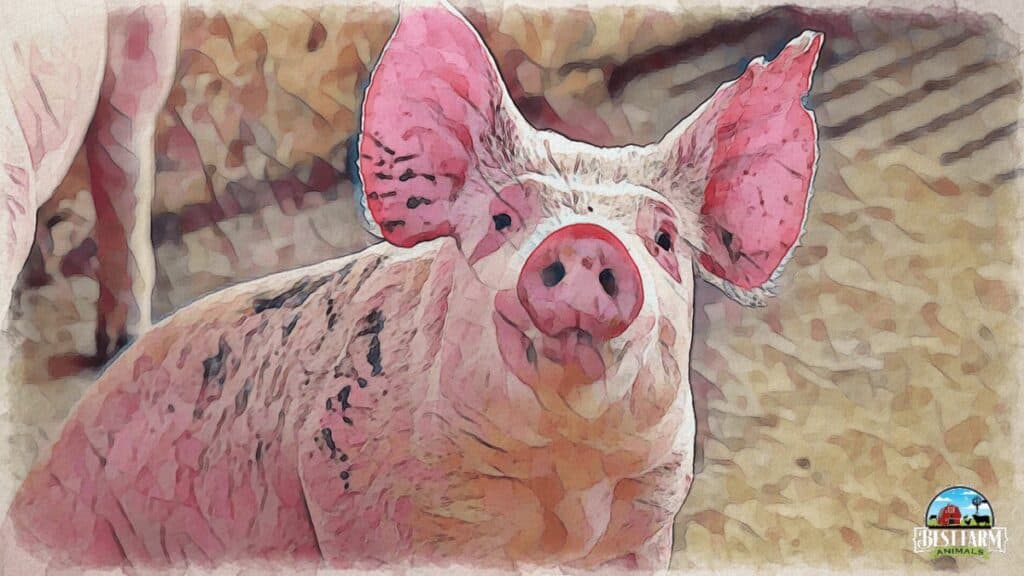
#2 Pigs Use Their Mouths to Explore New Objects
Pigs in sterile enclosures that lack any environmental enrichment are liable to explore every new item with their mouths. Pigs don’t have hands to feel items so their mouths are the best way for them to understand their world. Unfortunately, this may include their handlers.
This isn’t as much of a problem with pigs that are kept in pens with entertainment, variety, or natural stimuli. Trees, bushes, and even changing weather provides stimuli to pigs.
#3 Food-Related Aggression can Lead to Biting
This type of pig aggression is more common in house-trained potbellied pigs than in those living in commercial farming environments. Feeding your pig by hand, like you would a puppy, causes the pig to feel insecure about its food. Feeding pigs by hand may cause them to become greedy and start biting to secure more food.
It’s better to provide your pig free-choice access to food so they can eat whenever they are hungry. This will help to prevent your pig from developing a scarcity mindset and becoming more aggressive around food.
#4 Pigs Bite to Establish Dominance
As pigs mature, they feel big and strong enough to establish themselves higher up the hierarchy. A house-bound pig may become territorial and attempt to establish dominance by biting other household members and visitors. The Most Aggressive Pig Breeds
Although the wild boar can be highly aggressive, most domestic pig breeds are docile. Even domestic pigs may turn on a human in certain circumstances, however.
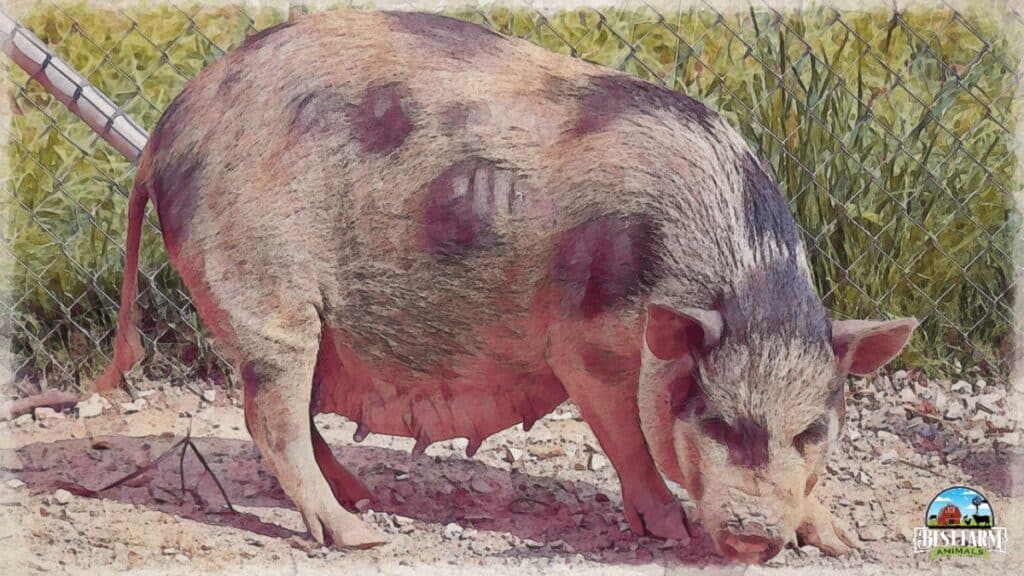
8 Tips to Stop Pig Biting
The following management strategies can assist you in lowering the likelihood of violent conflicts with your pigs. Usually, only certain pigs will be aggressive at first.
#1 Socialize Pigs with Other Pigs
By early piglet socialization with people, you can reduce pig aggression.
Avoid crowding your pigs together to lower their stress levels. Give pigs access to pens that enable them to share essentials like food, water, or shade and explore their surroundings.
Establish your dominance by giving your pig a firm response early on, but never using aggression or threats. When training your pig, set boundaries using a training board rather than frightening it.
Early socialization with other pigs enhances piglets’ social skills and lessens the likelihood of hostile interactions later.
A pig’s aggressive tendencies can also be controlled by minimizing changes to the social order. Pig regrouping is something that Dr. Turner advises against whenever possible. Mixing pigs mixes up the social hierarchy is and increases the herd’s stress. Making any necessary adjustments to the social structure as soon as possible is preferable.
During the reorganization, offering food at will can lessen the occurrence of aggressive conflicts.
#2 Aggression and Boredom are Decreased in an Enriched Environment.
Pigs forage naturally, sifting through the soil for roots and other delicious underground foods. You can reduce boredom and promote natural behaviors by giving your pigs a substrate to forage on.
You can give them more stimulation by filling their enclosures with enrichment items. Chains, rubber boots, hoses, balls, and other objects can keep your pigs occupied and lessen the likelihood of conflict.
#3 Pig Aggression Is Exacerbated By Overcrowding.
Pigs will fight for the best positions when cramped, especially in extremely cold, wet, or hot weather. Your pigs will be less stressed and aggressive if you give them enough space and a safe place to live.
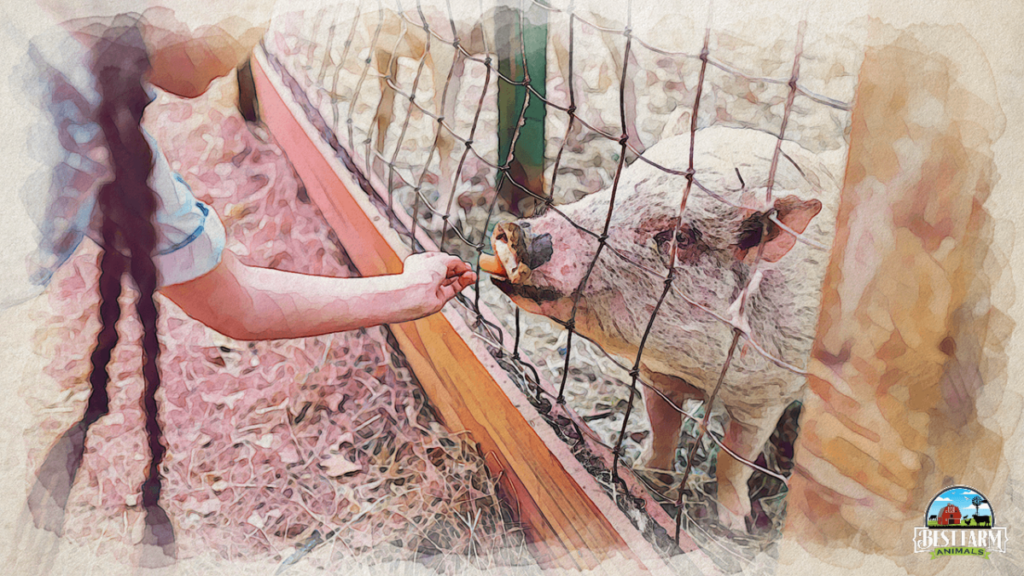
#4 Diet and Nutrition Can Help To Reduce Aggression
According to studies, eating diets low in protein can make aggressive behavior more common. Similarly to this, adding tryptophan to your pigs’ diets can lessen aggression in weanlings.
Aggression and unwanted behaviors can be decreased by increasing the protein content and frequency of food distribution.
#5 Creating Trust Will Make Your Pig More At Ease
Pigs fight back against potential predators by being aggressive. Your pig is more likely to act aggressively if it feels threatened by you. Building trust lessens that aggression and makes handling situations safer.
By speaking softly to your pig, you can build trust with it. Move deliberately and slowly, and give your pigs treats and nibbles as you go.
Give your pig more room if it turns away from you. Allow your pig to come over to you while rewarding it with delectable treats.
Avoid speaking loudly or moving quickly to avoid startling the pig and evoking an aggressive reaction.
#6 Pigs Stay Calm When They Have Access To Essential Resources
To defend essential resources like food, shelter, wallows, and shade, dominant pigs will attack other pigs. Therefore, aggressive behavior should decrease if you give the herd enough resources.
That requires making sure pigs have enough food available. When given the option to choose between different feeds, pigs are also calmer.
It’s crucial for pigs to have access to wallows, water, and shade, especially during hot weather when they are vulnerable to heat stress.
#7 Breeders Should Breed Genetic Lines With Low Aggression
According to studies, sow aggression is a heritable trait. In an effort to develop highly productive genetic lines, breeders may unintentionally choose aggressive bloodlines.
However, aggression harms the welfare and productivity of pigs, particularly sows. As a result, scientists advise pig breeders to “develop low aggression genetic lines.”
These social creatures can live in groups more easily thanks to this breeding strategy without sacrificing productivity or profitability.
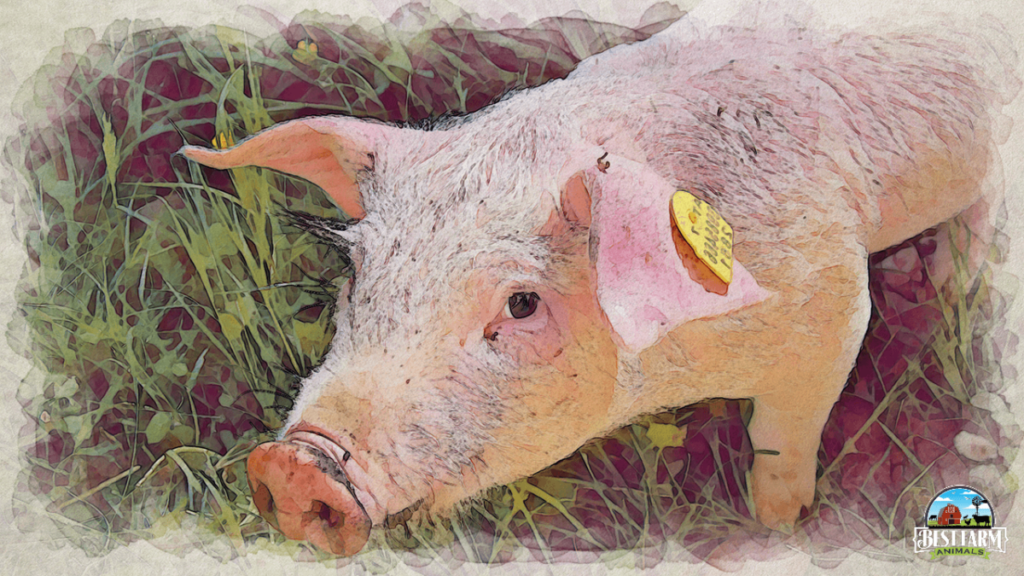
#8 Establishing Dominance Promotes a Safe Working Environment
You should establish yourself as a powerful member of your pig’s social hierarchy even though you don’t want to scare or intimidate it.
Pigs in the dominant herd use the available space to demonstrate their superiority. They’ll intrude on the personal space of inferior pigs, compelling them to yield and back off.
You will move up in the social hierarchy if you emulate this behavior.
Slowly approach your pig and enter its personal space. Watch how he responds to you getting close. Even if he leaves, you will still be in charge of him. He has crossed the line and is attempting to establish himself as the dominant leader if he enters your space.
You can train your pig to respect your personal space by applying pressure. You might require a livestock sorting board if your pig is already displaying aggressive behavior in order to protect yourself while training.
Increase the pressure if your pig approaches you. Move confidently in his direction while yelling, “Back up!” To further emphasize this, clap or stamp your foot. Release the pressure and praise your pig when he begins to back off or exhibit any signs of submission.
Pig Bite Treatment: What to Do If You Are Bitten
If a pig bites you, clean the wound immediately with warm water and soap. The wound should then be covered with a clean bandage. Seek medical attention immediately, especially if you’ve not been treated for rabies. If signs of infection occur, such as redness, pain, or swelling, the doctor will administer proper treatment. It is also important to monitor the bitten area for any signs of rabies,
Do pig bites need antibiotics?
Pig bites need antibiotics because they introduce pathogens into the human body, which could result in infection. Most of these antibiotics are usually prescribed by doctors and can be gotten in the hospital.
Amoxycillin plus clavulanate is effective in treating the pathogens most commonly associated with pig bites, such as hemolytic streptococci, Bacteroides spp., and Pasteurellaceae.
Other microorganisms from serious infections due to pig bite resistant to Amoxycillin plus clavulanate can be treated with ciprofloxacin combined with co-amoxiclav and intravenous injections of benzylpenicillin, flucloxacillin, and metronidazole.
How To Discipline A Pig For Biting:
When disciplining a pig for biting, it is important to be consistent and to use positive reinforcement such as treats or verbal praise when your pig is behaving and a stern “No!” or “Bad Pig” if he is not.
If you show fear or hit your pig when it bites you’ll only make matters worse and put your pig at a greater risk of becoming aggressive.
Also, If your pig is biting out of aggression or fear, it is important to address the underlying cause of the behavior. Make sure your pig feels secure and address medical issues causing your pig to bite.
Can you get rabies from a pig bite? You can get rabies from a pig bite if the pig is infected with rabies. Pigs can get rabies from the bite of a rabid dog or other animals. When a rabid dog bites a pig, it takes about 20 days for the pig to show symptoms of the virus, and the pig usually dies 2-3 days after the symptoms manifest.
If the pig bites you when it hasn’t been diagnosed of rabies, or even when the symptoms of rabies manifest, you can get rabies from its bite.
FAQs
How strong is a pig bite?
An average domestic pig has a bite force of around 50-100 pounds per square inch, which is enough to break the skin and cause serious damage. Wild pigs have a bite force of up to 300 pounds per square inches, which is strong enough to crack bones. Pig bites are powerful, but in most cases, the severity of the bite ranges from mild to severe, depending on the situation, size, and breed of the pig.
Let’s address the following questions on pig bites:
Do Baby Pig Bites Hurt? Baby pig bites hurt because they have sharp teeth that can easily slice through the skin if they bite too hard. Baby pigs’ teeth should be clipped about 15 minutes after birth to prevent cuts that eventually lead to infection on the sow’s udder.
It is important to be careful when handling baby pigs, and always to supervise them when they are around people.
Do Farm Pigs Bite? Most farm pigs do not bite, but biting can happen when pigs fee scared. Most farm pigs are usually calm and they will not bite unless they feel threatened or scared. Domesticated pigs may bite if they aren’t treated well or trained well. A spoiled farm pig could also bite to get it’s way when trying to get what it wants, to establish territory, or to take a treat forcefully. Pigs may bite due to heat stress, overcrowding, health issues, or because of limited resources., because it wasn’t trained properly.
My Most Used Pig Supplies
This list contains affiliate products. Affiliate products do not cost more but helps to support BestFarmAnimals and our goal to provide farm animal owners with accurate and helpful information.
Purina Pig Chow will last well (or Mazuri is popular, but I haven’t tried it), and the stainless steel non-skid bowls that will help keep the mess down.
A pig blanket to keep her warm. This one also has bright colors and helps to provide rooting without the destruction.
Pig Harness for walking and handling your pig. There are a lot to choose from, but this one is pretty easy to use. If you want one that has a separate leash, this looks like a good one.
A large crate for keeping her safe in your house at night and when you leave the house. This is essential. You’ll also want a litterbox, and I like mine with a lid for nighttime. Pine shavings are best, and you may be able to find them in larger quantities locally.
When you have accidents, Odoban will help eliminate odors. When you are potty training, these floor pads work great for keeping your house clean while training her to go in certain places.
You’ll also want an outdoor house to keep her warm when she gets outside time, an essential part of her development.
Dewormer- Ivermectin is the primary dewormer I use, although I do rotate with a non-ivermect ingredient once so that the worms don’t get immune to it.

